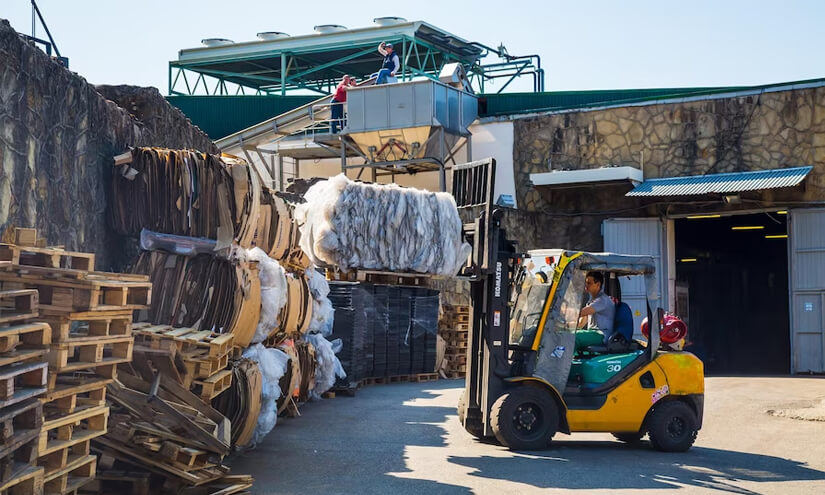Table of Contents
What is Scrap Junk Business?
The scrap junk business involves the buying and selling of various recyclable materials, including metals, paper, plastic, and electronics.
Individuals, businesses, and industries typically discard these materials, which can be processed, sorted, and sold to manufacturers for reuse in producing new products.
The scrap junk business plays an essential role in the recycling industry, helping to reduce waste and conserve natural resources. It may involve repairing, refurbishing, and reselling items through various channels.
A junk business requires knowledge of items, market demand, pricing, regulations, and logistics. However, it can promote sustainability and cater to budget-conscious consumers.
Researching local laws, obtaining permits, and consulting with professionals is essential for success.
Market Insight: The scrap junk business involves buying and selling recyclable materials such as metal, plastic, paper, and electronics. You can turn other people's trash into your treasure with the right knowledge and tools.
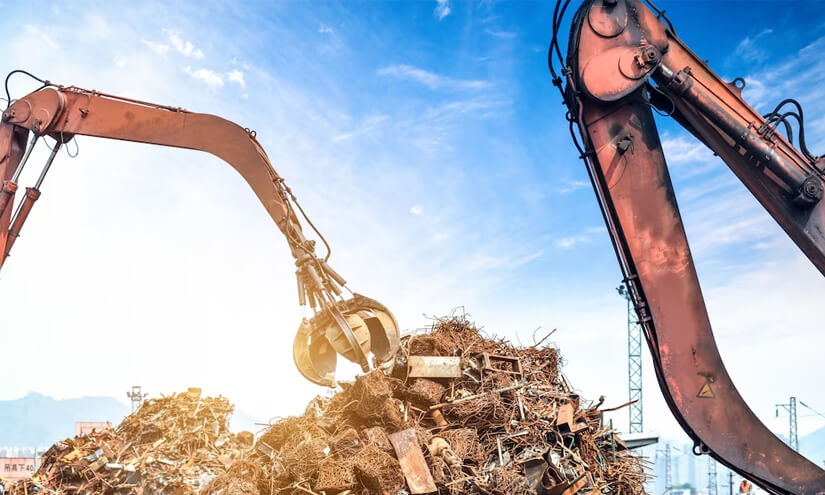
Types of Scrap Junk Business Models
Several business models can be used in the scrap and junk business:
1. Scrap metal recycling:
This involves collecting and recycling metal scraps and reselling them to manufacturers.
2. Junk removal:
This involves collecting and disposing unwanted items such as furniture, appliances, and electronics. The items can be sold or donated, and the service can be offered to residential and commercial clients.
3. Salvage yard:
This involves buying and selling used auto parts and other salvageable materials.
4. E-waste recycling:
This involves collecting and recycling electronic waste such as computers, televisions, and cell phones.
5. Precious metal recovery:
This involves extracting precious metals such as gold, silver, and platinum from electronic, industrial, and jewelry waste.
6. Demolition:
This involves dismantling and removing large structures such as buildings, bridges, and roads. Then, the materials can be sold or recycled.
7. Upcycling:
This involves turning old and unwanted items and turning them into something new and valuable, such as repurposing old furniture into home decor items.
The choice of business model will depend on factors such as location, available resources, and target market. Therefore, starching and analyzing the market before choosing a business model is essential.
Choosing a business model that aligns with your resources, skills, and market opportunities is essential. Some businesses may also adopt a combination of business models or evolve their models as they grow and adapt to changing market dynamics.
Starting a Scrap Junk Business requires careful planning, market research, compliance with regulations, and efficient operations. It can be a rewarding and profitable business contributing to sustainability and circular economy practices. Seek advice from professionals, mentors, or industry experts to increase your chances of success.
Pros and Cons of a Scrap Junk Business
Here are some pros and cons of starting a scrap junk business:
Pros:
- Revenue potential from selling valuable scrap materials.
- Opportunity to contribute to environmental sustainability by recycling and repurposing materials.
- Flexibility to choose a niche or market segment within the scrap junk industry.
- Potential for low startup costs and high-profit margins.
- Opportunity to build a business that aligns with personal values, such as sustainability and resource conservation.
Cons:
- Market volatility and fluctuating prices for scrap materials.
- Challenges in sourcing consistent and quality scrap materials.
- Potential for regulatory compliance and environmental compliance requirements.
- Physical labor and safety risks associated with handling and processing scrap materials.
- Competitiveness in the industry, with the presence of established players.
- Potential for operational challenges, such as logistics, storage, and processing capacity.
- Dependence on market demand and economic conditions for profitability.
It’s essential to carefully weigh the pros and cons, conduct thorough research, and develop a comprehensive business plan before starting a scrap junk business to mitigate risks and maximize opportunities for success.

Scrap Junk Business Investment
The investment required for a scrap junk business can vary widely depending on the scale of operations, location, equipment, and facilities needed.
Here are some approximate estimates of one-time setup costs:
- Small-scale operation: $10,000 to $50,000
- Medium-scale process: $50,000 to $150,000
- Large-scale operation: $150,000 to $500,000 or more
The investment required for a scrap junk business in the UK can vary depending on the size and scale of the operation, location, and other factors.
Here are some approximate estimates of one-time setup costs for a scrap junk business in the UK:
- Small-scale operation: £5,000 to £30,000
- Medium-scale operation: £30,000 to £100,000
- Large-scale operation: £100,000 to £500,000 or more
These costs may include equipment and machinery (e.g., sorting, processing, and transportation equipment), facility setup (e.g., leasing or purchasing a space for processing and storage), regulatory permits and licenses, initial inventory of scrap materials, and other operational expenses.
Note: These are rough estimates, and the actual investment required may vary significantly depending on the business’s specific circumstances.
Conducting thorough market research, creating a detailed business plan, and consulting with financial experts can help determine the exact investment requirements for a scrap junk business in the UK and the US.
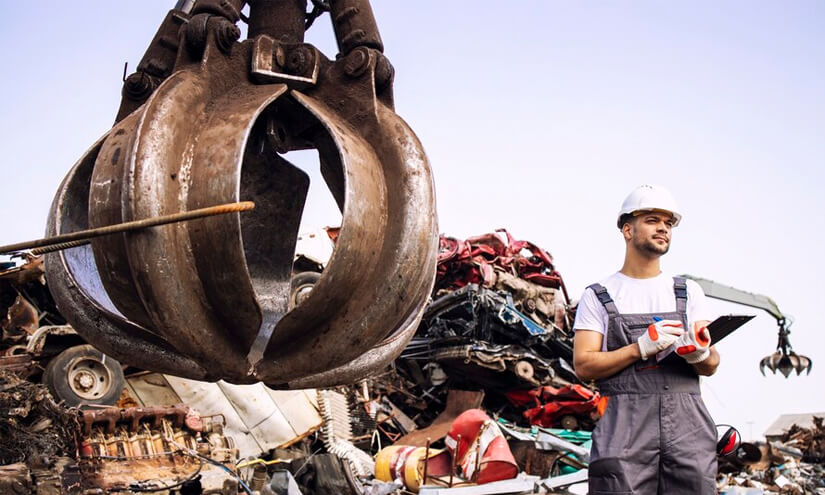
How much will you earn in Scrap Junk Business?
The earnings potential for a scrap junk business in the UK and USA can vary depending on various factors such as the size company, the number of customers served, the type and quality of the scrap materials collected, and the competition in the local market.
As a franchisee, you must pay the franchisor a percentage of the revenue as franchise fees or royalties. The franchise fees or royalties can vary depending on the franchise agreement.
Generally, a successful scrap junk business in the UK and USA can generate a significant income for the owner, mainly if the company can establish a large and loyal customer base.
However, the income potential will depend on the specific business model, operating costs, and market conditions.
It’s important to note that starting any business involves risks and uncertainties, and success is not guaranteed.
It’s essential to conduct thorough research, develop a solid business plan, and seek professional advice before investing in any business opportunity.
Looking for LOGO Design + Branding?
iMedia Ad Agency is an award wining Logo Design Company run by Sushant & Vijaya, offering professional logo designs for Start-ups / SMEs / Home Businesses Owners.
WHAT ALL YOU WILL GET IN YOUR LOGO PACKAGE?
- Full ownership of final Logo remains with the client
- 100% original logo artwork
- No internet copy-paste work
- Original sketch supplied
- Super High resolution Vector file formats
- Free 1 month logo backup support
- Telephone, chat, skype & email support
Get all Business Launch Solutions under one roof Logo, Corporate Identity, Invite, Stationary, Packaging, Broucher, Product Display, Web Design, Business Blog, Shopify Store, Startup Pitch Deck, Google SEO, Product Reviews, Business Articles, and Social Media Management.
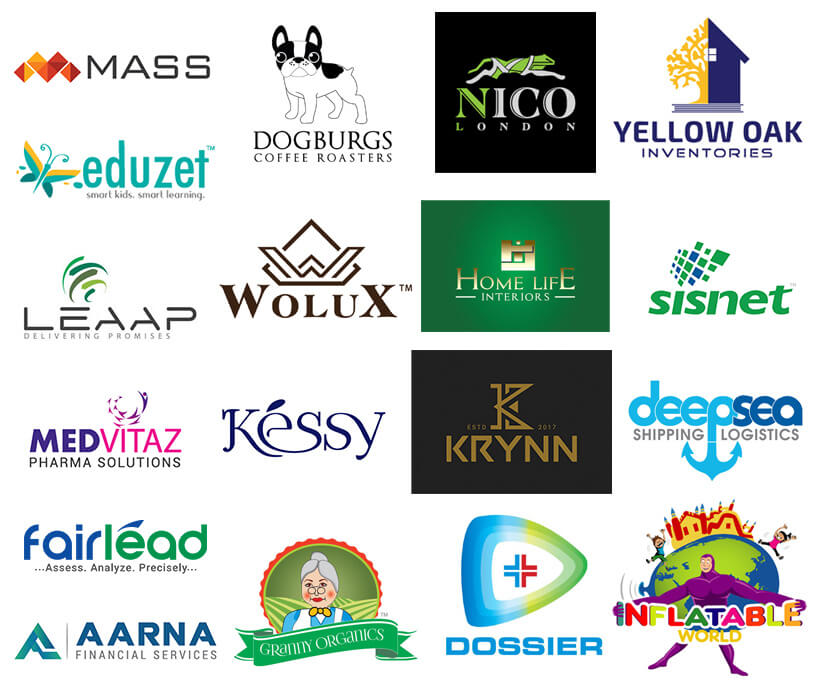
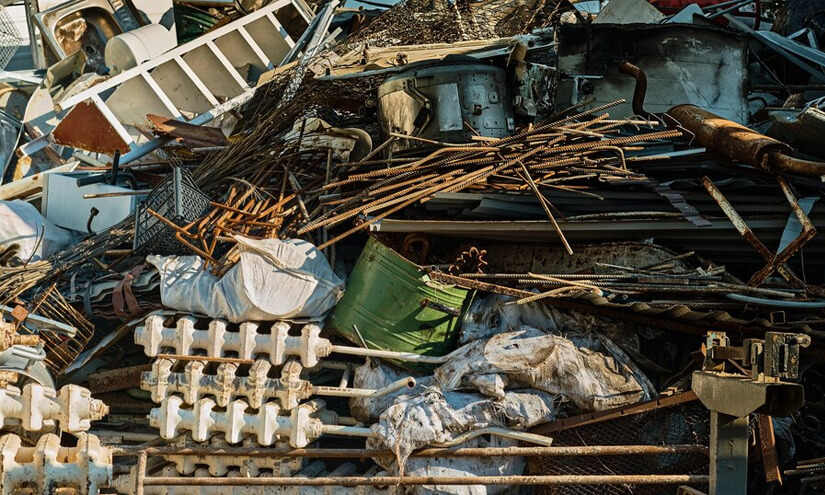
Checklist of Equipment Needed for Scrap Junk Business
Running a scrap junk business requires specific equipment to collect, process, and manage various types of scrap materials. The equipment needed can depend on the nature and scale of your business operations.
Here is a general checklist of essential equipment that may be required for a scrap junk business:
Collection and Transportation Equipment:
- Trucks, trailers, or vans for transporting scrap materials
- Forklifts or loaders for handling heavy or bulky scrap items
- Hand tools such as shovels, hammers, wrenches, and cutting tools for dismantling and processing scrap materials
- Pallets or containers for storing and organizing scrap materials
Processing Equipment:
- Metal balers or compactors for compressing scrap materials into bales or blocks
- Shredders or crushers for breaking down more oversized scrap items into smaller pieces
- Sorting equipment such as magnets, screens, and conveyors for separating different types of scrap materials
- Shears or cutters for cutting and processing metal items
- Industrial scales for weighing and measuring scrap materials
Safety Equipment:
- Personal protective equipment (PPE) such as gloves, safety goggles, hard hats, and safety boots for workers
- Fire extinguishers and safety signage for fire safety
- Ventilation systems for managing fumes or dust generated during processing operations
- First aid kits and safety protocols for handling potential injuries or accidents
Office Equipment:
- Computers, printers, and software for managing inventory, finances, and other administrative tasks
- Office furniture and supplies for managing paperwork, records, and documentation
Miscellaneous Equipment:
- Business signage for advertising and branding
- Security measures such as surveillance cameras, alarms, and fencing to protect the premises and assets
It’s essential to assess the specific needs of your scrap junk business and invest in appropriate equipment that meets your operational requirements and complies with relevant safety and environmental regulations.
Conducting thorough research and consulting with industry professionals can help ensure that you have the necessary equipment to operate your scrap junk business effectively.
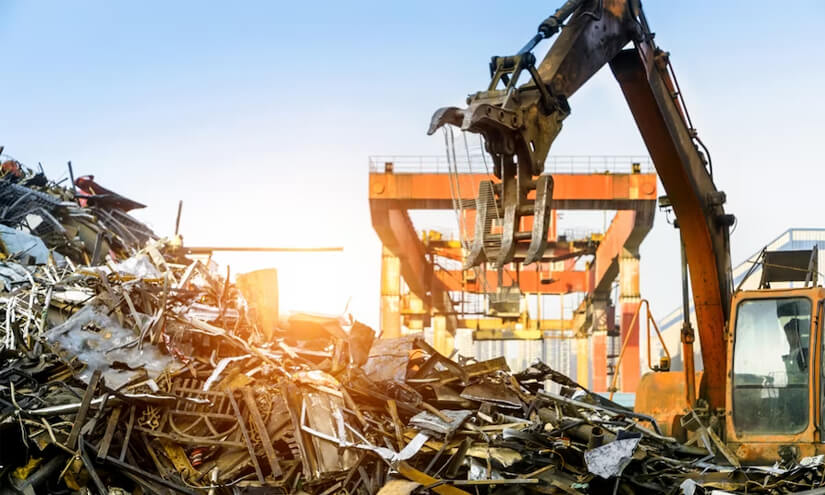
Types of Staff Needed to Start Scrap Junk Business
Starting a scrap junk business in the UK and USA will require different types of staff depending on the size and scale of the operation. Here are some common staff positions that may be necessary:
1. Owner/Manager:
The owner/manager is responsible for overseeing the operations, managing staff, and handling administrative tasks such as accounting, marketing, and customer service.
2. Drivers:
Drivers collect and transport scrap materials from customers to the recycling facility. They may also be responsible for loading and unloading materials.
3. Sorters:
Sorters are responsible for sorting and categorizing the collected scrap materials according to their type and quality. Therefore, they may need various tools and equipment, such as magnets, scales, and cutting tools.
4. Mechanics:
Mechanics are responsible for maintaining and repairing the vehicles and equipment used in the scrap junk business. They may also inspect and certify the equipment to meet safety and environmental regulations.
5. Sales and marketing staff:
Sales and marketing staff promote the business and acquire new customers. They may need to develop marketing strategies, participate in trade shows and events, and build relationships with potential customers.
6. Administrative staff:
The administrative staff handles bookkeeping, data entry, and customer service tasks.
It’s important to note that the specific staffing needs will vary depending on the size and scale of the business. For example, a small-scale operation may only require one or two staff members, while a more extensive procedure may require an entire team to manage various aspects of the business.
Trends & Challenges in the Scrap Junk Business
Trends:
1. Increased focus on sustainability and environmental responsibility.
2. Technological advancements and automation in scrap processing and management.
3. Growing demand for recycled and repurposed materials.
4. Shift towards online marketplaces and e-commerce in the scrap junk industry.
Challenges:
1. Market volatility and fluctuating prices for scrap materials.
2. Sourcing consistent and quality scrap materials.
3. Regulatory compliance and environmental compliance requirements.
4. Competition from established players in the industry.
5. Operational challenges such as logistics, storage, and processing capacity.
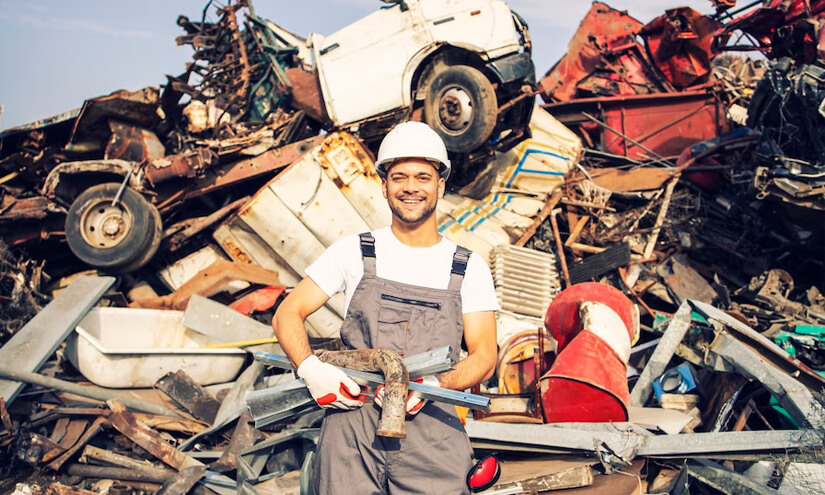
List of services in a Scrap Junk Business
A scrap junk business typically involves dealing with various materials and providing related services. Here is a list of the top products and services that can be offered in a scrap junk business:
1. Scrap collection and transportation:
It involves collecting and transporting scrap materials from various sources, such as residential, commercial, and industrial locations, to your scrap yard or processing facility.
2. Scrap processing and sorting:
It includes sorting, dismantling, cutting, crushing, shredding, or compacting scrap materials to prepare for recycling or resale.
3. Scrap recycling:
It involves processing scrap materials to recover valuable metals, plastics, and other materials for recycling or reuse.
4. Scrap trading or sales:
Involves buying and selling scrap materials to manufacturers, mills, and other end users for further processing or manufacturing.
5. Scrap consulting and advisory services:
Provides expertise and guidance on scrap management, recycling practices, compliance with environmental regulations, and other related services.
Identifying the specific products and services that align with your business goals, capabilities, and market demand is essential. Offering a diverse range of products and services can provide opportunities for revenue generation and customer retention in the scrap junk business.
However, it’s crucial to comply with all applicable laws, regulations, and industry standards for handling, processing, and recycling of scrap materials.
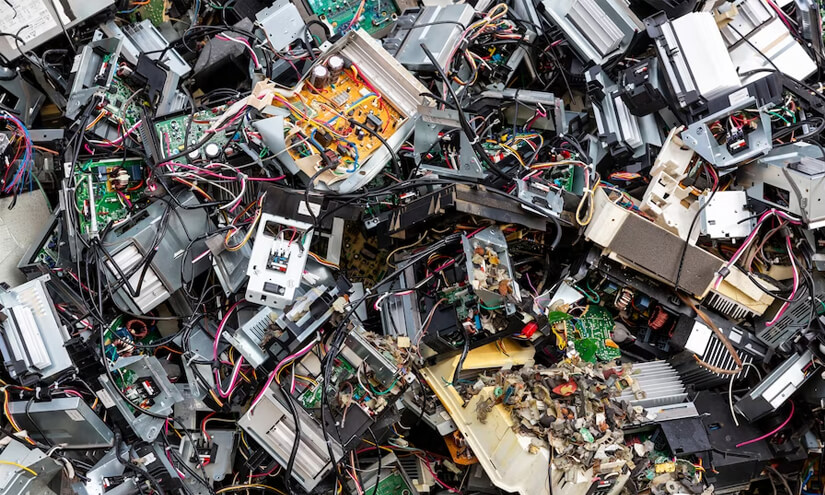
Service Rate Card of Scrap Junk Business
The service rates for scrap junk businesses in the UK and USA can vary depending on several factors, such as the type of materials being collected, the number of materials, the distance traveled, and the competition in the local market.
Here are some general price ranges for scrap junk services in the UK and USA:
1. Metal scrap:
Prices for metal scrap collection and disposal can range from $50 to $500 per load, depending on the type and quantity of metal.
2. Appliance removal:
Prices for appliance removal and disposal can range from $50 to $200 per appliance, depending on the size and weight of the device.
3. Electronics recycling:
Prices for electronics recycling can range from $5 to $20 per device, depending on the type of device and the recycling process used.
4. Junk removal:
Prices for general junk removal can range from $100 to $500 per load, depending on the size and weight of the items being collected.
It’s important to note that these prices are only estimates and can vary depending on the specific services the scrap junk business offers and the local market conditions.
The franchisee may also need to pay the franchisor a percentage of the revenue as franchise fees or royalties.
Starting a Scrap Junk Business can be an exciting venture. Here are some key steps to help you get started:
1. Research and Planning
2. Legal and Financial Considerations
3. Procuring Scrap and Junk Materials
4. Processing and Refurbishing
5. Sales and Marketing
6. Operational Logistics
7. Continuous Improvement

Licenses in a Scrap Junk Business
Some of the standard licenses and permissions that may be required for a scrap junk business in the UK and US can include the following:
1. Business registration:
Registering your business with the appropriate government authorities, such as Companies House in the UK or the Secretary of State’s office in the US, may be required to operate your scrap junk business legally.
2. Environmental permits:
Depending on the type of materials you handle and process, you may need to obtain environmental permits or licenses to comply with local environmental regulations, waste management laws, and recycling requirements.
3. Transportation permits:
Suppose your scrap junk business involves transporting materials using commercial vehicles like trucks or trailers. In that case, you may need to obtain permits or licenses for transportation operations, including relevant vehicle registration and insurance.
4. Scrap metal dealer’s license:
In the UK, you may need a Scrap Metal Dealer’s License from the local council to legally trade scrap metal.
5. Health and safety permits:
Ensuring a safe working environment for your employees and complying with health and safety regulations may require obtaining permits, licenses, or certifications related to workplace safety, hazardous materials handling, and other relevant areas.
It’s essential to consult with local authorities, regulatory agencies, and legal professionals to determine the licenses and permissions required for your scrap junk business in your specific location and to ensure you comply with all applicable laws and regulations.
Non-compliance with licensing requirements can result in legal consequences and financial penalties, so it’s crucial to be aware of and adhere to all relevant regulations.

FREE DOWNLOAD
Launch your Money Blog
Build a 24/7 money machine that you can create and grow from anywhere in the world you are…

Health and Safety Measures in the Scrap Junk Business
Health and safety measures are crucial in a scrap junk business to protect the well-being of employees, customers, and the environment. Here are some essential health and safety measures that should be considered and implemented in a scrap junk business:
1. Personal Protective Equipment (PPE):
Provide and require appropriate PPE, such as gloves, goggles, hard hats, steel-toed boots, and other protective gear, depending on the tasks performed and the type of scrap materials being handled.
2. Training and Education:
Provide comprehensive training to all employees on proper handling, processing, and transportation of scrap materials, as well as emergency procedures, fire safety, and hazardous materials handling. Regular refresher training should also be provided to ensure ongoing compliance and awareness.
3. Equipment Safety:
Ensure that all processing and transportation equipment is adequately maintained, operated by trained personnel, and equipped with necessary safety features, such as emergency stop buttons, guarding, and warning signs. Follow all manufacturer’s instructions and industry best practices for equipment operation and maintenance.
4. Hazardous Materials Handling:
Identify and properly handle hazardous materials that may be present in scrap materials, such as asbestos, lead, mercury, and other harmful substances. Follow all local, national, and international regulations and guidelines for handling, storage, and disposal of hazardous materials.
5. Fire Prevention:
Implement fire prevention measures, such as proper storage of flammable materials, regular inspection, and maintenance of electrical systems, fire detection and suppression equipment installation, and employee training on fire prevention and response procedures.
6. Environmental Protection:
Comply with all applicable environmental regulations for handling, processing, and disposal of scrap materials. Implement measures to prevent pollution, such as proper stormwater management, containment of spills, and recycling/reuse of waste materials.
7. Emergency Preparedness:
Develop and implement an emergency response plan that includes procedures for handling accidents, spills, fires, and other incidents. Conduct regular drills and exercises to ensure employees are familiar with emergency procedures and can respond effectively in an emergency.
8. Record-Keeping and Reporting:
Maintain proper records of safety inspections, training, incidents, and other relevant information. Report any incidents or near misses to relevant authorities as required by law.
It’s essential to regularly review and update health and safety policies and procedures to ensure compliance with regulations and industry best practices and to promote a safe working environment in a scrap junk business.
Proper health and safety measures protect the well-being of employees and customers and help prevent accidents, incidents, and legal liabilities that may adversely impact the business.
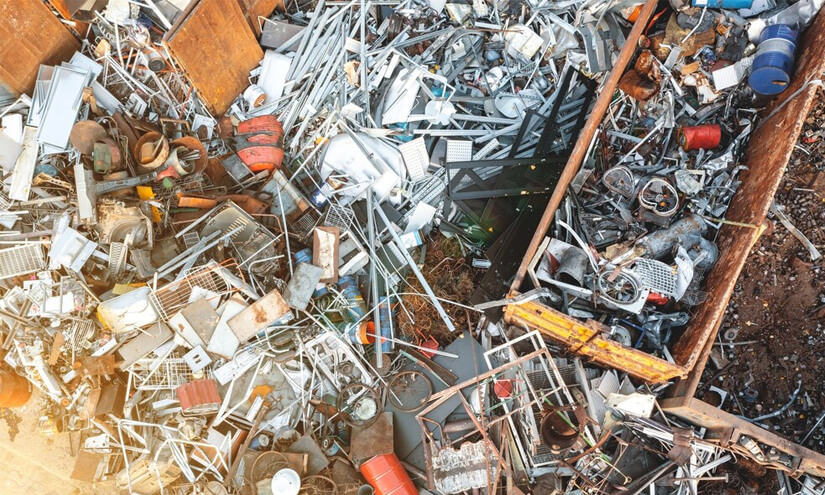
Shall I go for a Scrap Junk Business franchise?
If you are considering starting a franchise in the scrap junk business in the UK and USA, there are several factors you should consider. Here are some of the critical elements:
1. Market demand:
Conduct market research to determine your area’s demand for scrap junk services. Look for factors such as the size of the local population, the number of households, and the presence of industries that generate scrap materials.
2. Competition:
Research the competition in your area to determine the level of competition and the services they offer. Then, look for ways to differentiate your business and provide unique value to your customers.
3. Startup costs:
Determine the startup costs of starting a scrap junk franchise, including equipment, vehicles, supplies, and marketing expenses. Consider the franchise fees and ongoing royalties charged by the franchisor.
4. Licensing and permit requirements:
Research the licensing and permit requirements for starting a scrap junk business in your area. For example, you may need a waste carrier’s license and other permits in the UK and USA to operate legally.
5. Franchisor support:
Evaluate the franchisor’s support and training, including marketing, operations, and technical support. In addition, consider the franchisor’s reputation and track record of success.
6. Your personal goals and experience:
Consider your goals, experience, and skills when evaluating the potential of starting a scrap junk franchise. Determine if the franchise opportunity aligns with your personal and professional goals.
Starting a scrap junk franchise in the UK and USA can be a profitable and rewarding business, but it requires careful planning and research to succeed. Evaluate all the factors involved and seek professional advice before making a decision.
Conclusion
Starting a scrap junk business in the USA and UK can be lucrative, given the significant demand for recycled materials in these regions. The first step towards beginning this business involves conducting thorough research on the market and identifying a niche that suits your interests and capabilities.
You must also obtain the necessary permits and licenses, acquire equipment and tools, and establish a reliable network of suppliers and buyers.
Building a solid online presence and investing in marketing and advertising can help you attract and retain customers.
With dedication, hard work, and a commitment to sustainability, you can build a successful scrap junk business that generates profit and contributes to environmental conservation.

Want to Save Time in your Business Launch?
- How to Create a Business Plan
- What is Market Research, USP, Niche & Positioning
- How to find a suitable name for your business
- How to create your brand image (Logo + Branding)
- How to Register Your Business
- How to Register for Taxes
- How to get Licenses / Permits
- How to Open a Business Bank Account
- How to Get Business Insurance
- Which Payment Processing Terminal (POS) to buy
- How to get Funds for your Business
- How to do Sales & Marketing – Offline & Online
- Why have a Website / Blog / Social Media
- How to build & train your Dream Team
- How to provide Excellent Customer Service
- Buying an Old Business Vs Franchisee Vs Own Brand from Scratch
Handpicked inspirational Youtube videos for you
How to Successfully Start your own Scrap Metal Business! – YT Channel ‘B.A.C.S’
Scrap Shack is Open for Business – Make Money Scrapping Junk Metal – YT Channel ‘Scrap & Pallet Man’
A. A scrap junk business may accept a wide variety of materials, including ferrous and non-ferrous metals, plastics, paper, electronics, appliances, vehicles, and other recyclable or reusable items.
A. The value of scrap materials is typically determined based on factors such as market demand, current market prices, quantity, quality, and condition of the materials. Scrap prices can fluctuate based on global commodity markets and local demand.
A. Handling hazardous materials in a scrap junk business requires compliance with applicable regulations, such as proper storage, labeling, transportation, and disposal. It’s important to follow local, national, and international laws and regulations related to hazardous materials handling, including obtaining any required permits or certifications.
A. The required equipment for a scrap junk business may vary depending on the specific operations and services offered, but common equipment may include balers, shears, shredders, loaders, trucks, scales, and material handling tools.



